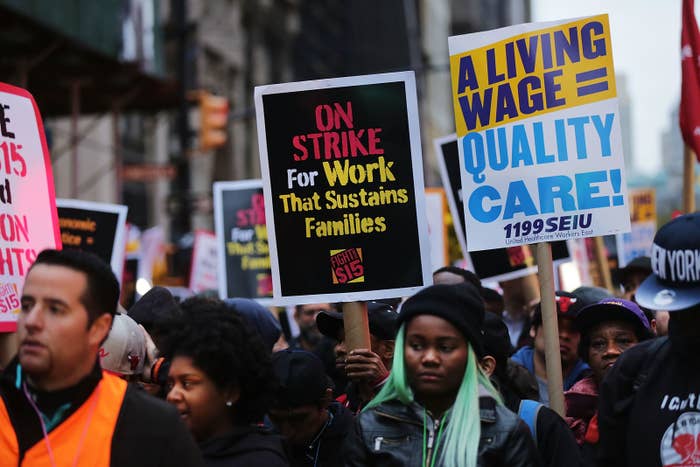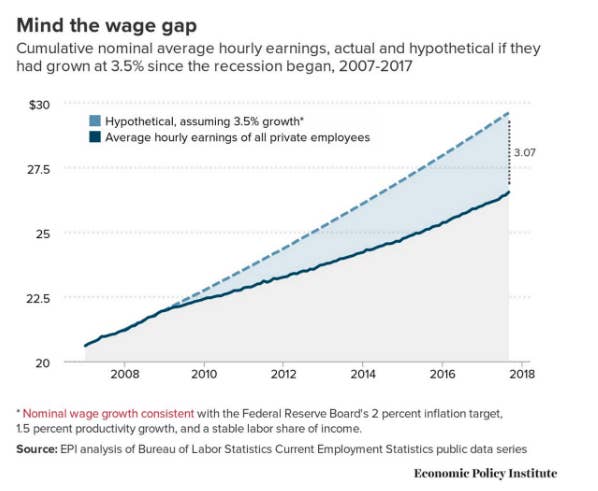
Wages are not rising the way they should, and that’s a problem for the majority of Americans who pay their bills with money they earn by working. It’s a problem for the economic theories that claim to map how everyone gets their share of a growing economy. And it's a problem for the economists who sound tone-deaf when they explain that the recovery is finally going great — except for wages. Neither the Democrats nor the Republicans have any good answers for this, because nobody thinks this is how it’s supposed to work.
In their write-up of the latest census poverty numbers, Elise Gould and Valerie Wilson of the Economic Policy Institute are blunt: “real median earnings of full-time workers — male and female, black and white — have been relatively flat since 2000.” Productivity — output per worker — grew by over 20% in the same time period, but the share of that value that workers take home has continued to decline.
Neoclassical economics does not have a term to explain the divergence between labor productivity and wages, but Marxism does: It’s called the rate of exploitation. And the rate of exploitation is growing.

Wages stagnating while unemployment falls and the economy grows goes against mainstream economic theory, which holds that when unemployment falls, the labor market tightens and workers can demand higher pay. The more that businesses need labor, the more workers can charge; it makes sense, but it’s not happening.
You would think the business press would be ready with some explanations, but they’re struggling. At Bloomberg, an explainer on why wage growth is sluggish begins by agreeing that it’s “a puzzle.” Conservatives believe the best way to increase wages is to grow the economy, but the connection between the two isn’t as tight as they had presumed. “That’s a puzzle” isn’t going to cut it.
For years, liberal thinkers have been offering their own formula that they claim leads to better pay. “Education Is the Key to Better Jobs” declared Brookings in 2012; “A Simple Equation: More Education = More Income” wrote New York Times economics columnist Eduardo Porter in 2014. The Democrats even made a riff on this in their party slogan this summer. It’s now a mainstream view that education is a solution to economic inequality, racial inequality, gender inequality, bigotry in general, job growth, economic growth, and winning elections: a “silver bullet” as a West Wing monologue once put it. But once again, the proof is in the pudding, and the pudding sucks.
There are many connections between education and individual, family, local, state, and national economic success. The most accessible, reliable way for Americans to improve their circumstances is to learn to do more things that employers are looking to pay people to do. The Democrats understand that, and they’ve consistently put education — as a form of skilling and job training, rather than intellectual exploration — near the center of their largely unsuccessful agenda. Despite general wage stagnation, the premium for workers with bachelor's degrees or better has increased significantly. It’s get skilled or get left behind in 21st-century America, and the Democrats don’t want people left behind; how could that be a bad plan or a hard sell?
I think most Americans understand something about the “skilling” theory that the Democrats don’t. To convert education into better life outcomes, you can’t just take your diploma to the bank. Skills are supposed to help workers get good jobs and perform well, rinse and repeat. Education (or “human capital”) makes workers more productive, which makes their workplaces more profitable, which means their bosses can afford to pay them more.
By now you may have spotted the problem. When workers improve their skills it doesn’t entitle them to more pay, or ensure them more pay — it merely enables companies to pay more. And given the option, companies would rather not pay you more.
Employers like to talk about the “skills gap,” but there is a permanent and unbridgeable divide between the supply of and demand for skilled labor. Business owners want a flood of applicants for every position, who are so well-qualified that they require no training — and they want that flood of competition to allow them to offer lower pay. Workers, on the other hand, want to get paid as much as possible, preferably without having to apply for 100 gigs at a time, or spend a decade and tens of thousands of dollars developing their skills.
The idea that these two sets of interests could ever come into a happy balance is a myth perpetuated by factory owners looking for ways to save money.
Wages will not go up just because the economy improves or because workers improve their skills. In 2015 some of the world’s biggest tech firms, including Apple and Google, paid over $400 million to settle accusations that they colluded to keep engineering wages low. Apple's and Google’s engineers are both educated and productive — among the most productive people in the world, by most measures. Their employers have so much cash they literally don’t know what to do with it all — and yet they’re still willing to tangle with the law just to pay people less.
Does anyone really believe employers in the rest of the economy, whose profits are rapidly being transferred to Silicon Valley, will somehow be more willing than Apple and Google to voluntarily offer up higher pay?
Republicans and Democrats alike don’t even have a name for what’s happening, let alone a serious idea of how to fix it. It’s not surprising then, that people are looking to Marx and socialism for explanations about the rate of exploitation. Employers can yell “skills gap” all day long, but they can’t keep workers fooled much longer, and their shareholders are not going to be happy when the only solution left is pitchforks at their doors.
Malcolm Harris is the author of Kids These Days: Human Capital and The Making of Millennials and a freelance writer based in Philadelphia.
Outside Your Bubble is a BuzzFeed News effort to bring you a diversity of thought and opinion from around the internet. If you don't see your viewpoint represented, contact the curator at bubble@buzzfeed.com. Click here for more on Outside Your Bubble.
